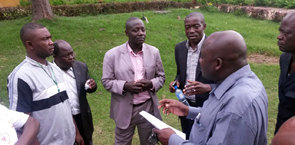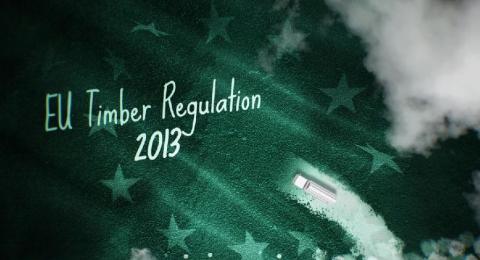Cameroonian SMEs determined to enter the EU timber market
Where there’s a will, there’s a way. Despite tough challenges, small and medium enterprises (SMEs) in Cameroon are working hard to deliver the assurance of timber legality required by their European business partners. Their latest tactic is to form a new national federation to facilitate dialogue and trade.
Pushed by the EU Timber Regulation (EUTR), companies in the EU are increasingly demanding proof of legal timber from their trade partners. This is a major challenge for small enterprises in timber producer countries such as Cameroon, where illegal logging is widespread and deeply entrenched in society.
With over 20 million hectares of forest, Cameroon is Africa’s largest exporter of tropical timber to the EU. Timber product exports from Cameroon are very much dependent on European markets, which are the principal outlets for the main export products - sawn lumber, plywood, and veneer.
Need for fast market adaptation
Cameroon has signed a Voluntary Partnership Agreement (VPA) under the EU FLEGT (Forest Law Enforcement, Governance and Trade) Programme. Under the VPA, the country is addressing the underlying governance issues and working towards a FLEGT license scheme documenting the legal origin of all timber produced there.
However, given the need for deep-seated change, the FLEGT process is bound to take time before it is possible to declare all Cameroonian timber legal. Meanwhile, the EUTR has already changed the EU market conditions. Cameroon’s timber enterprises – and in particular the SMEs – are in great need of help to navigate the EU market.
To fill this gap, a recent FLEGT project led by NEPCon addressed key barriers for Cameroonian SMEs to engage in legal timber trade.

The project Strengthening SMEs in Cameroon to meet FLEGT and EUTR requirements provided training, tools and practical guidance designed for SMEs.
The EU Delegation of Cameroon supported the project, and NEPCon project manager Leticia Calvo Vialettes underlines its role in the country’s FLEGT process.
“Whilst the project addressed the SMEs’ immediate challenges arising from the EUTR, it also served to underpin the country’s broader FLEGT process by building needed competencies amongst the SMEs,” she observes.
A pivotal trip to Brussels
A trip to Brussels for five SME associations organised by the project in November 2014 proved to be an eye-opener for the Cameroonian delegates. During their stay, they had ample opportunity to meet and discuss with European importers.
Pamphile Ntanga of the SME association FECAPROBOIS said, “We were moved by how serious professionals are here [in Europe] and by the quality of finished goods. We’ve come to realise that we must position ourselves on this market. The European Union is a very important market for Cameroon, an economic partner for 80-85% of our products. So it’s in our best interest to create partnerships with Europe.”
He added, “We talked and exchanged data with those who import wood from Cameroon. They told us what their conditions are and what their requirements are. We reassured them by giving them all the required guarantees to prove the legality of our wood.”
Sylvestre Nyeck Nyeck of the SME association GAFCAM acknowledged the need for Cameroonian SMEs to engage in EUTR due diligence. He said, “The importer must prove that the wood he’s importing is legal but we producers must help the importer to do this. […..]”.
New trade relations go both ways
The Cameroonian SMEs are not only looking for buyers in Europe, they are also seeking to expand their supplier base.
“The project was also beneficial for us because we met different material suppliers, which allowed us to equip ourselves,” says René Oukem of FECAPROBOIS. Mr Oukem took advantage of his stay in Europe to visit a manufacturer of outdoor furniture and wooden structures in the Czech Republic.
More than a year later, he tells NEPCon, “They visited us as well, and we have started to collaborate. We will provide them with machined wood parts and we will market their metal parts here in Cameroon. We expect to receive their first samples next week, and they will receive our first delivery in March 2016.” Mr Oukem says he is looking forward to expanding this kind of partnership.
A new business window for Cameroonian timber
As a direct outcome of the Brussels trip, some Cameroonian SME timber associations formed a national federation, Federation Nationale des Associations des PME/PMI de la Filiere Bois du Cameroun.
The federation aims to make the SMEs visible to EU trade partners and to facilitate matchmaking between EU-based and Cameroonian companies.
Mr Nyeck Nyeck said, “We realised that we had to form a single group, to face our European counterparts at all levels. I think that we’ll be more readily heard if we speak with one voice.”
“Streamlined solutions combined with continued guidance and support are clearly needed to help the Cameroonian SMEs to assure trade in legal timber,” says Ms Vialettes. “The new federation could play a key role in that process whilst showcasing Cameroonian legal timber products.”
SMEs are getting serious
According to Ms Calvo Vialettes, ensuring legal compliance at forest level is the biggest challenge.
"In the forest, major challenges remain related to workers’ rights, logging norms and environmental aspects,” she explains.
“It will be essential to provide specific training to the Cameroonian forestry sector, supporting them to implement the legality requirements and ensuring their proper engagement in the country’s VPA process.”
Despite expected bumps on the road ahead, the Cameroonian SMEs seem ready to buckle down to the task, says Ms Calvo Vialettes.
As Mr Nyeck Nyeck put it, “we’ll need new equipment, new technology and to learn as well, because it’s more than just technology. We need to be trained in management, technical issues and other areas”.
Zacharie Wandja of the timber association ANEFNTB saw wider benefits of meeting the EUTR. He said, “I believe that markets are more and more open to those who respect the law. That’s a benefit and means a professionalisation of the industry.”
Ms Vialettes is confident of the SMEs’ future success. She says, “With a strong pull from the EU market combined with strong commitment from Cameroon and its SMEs and support from the on-going FLEGT process, this is bound to move forward. I am firmly convinced that the SMEs will be able to build and strengthen their trade with EU partners.”
> Learn more about the project
Watch this video from the Cameroonian delegation's trip to Brussels:



